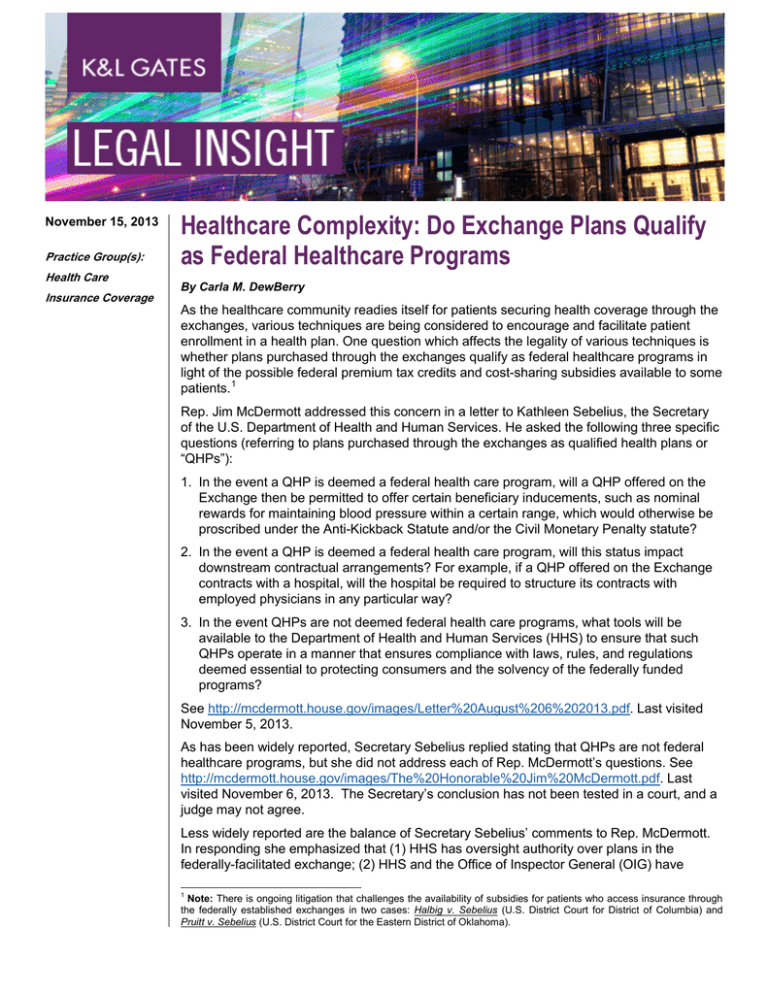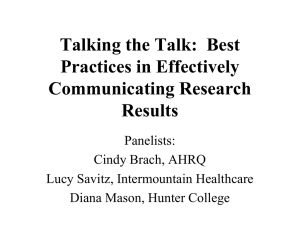
November 15, 2013
Practice Group(s):
Health Care
Insurance Coverage
Healthcare Complexity: Do Exchange Plans Qualify
as Federal Healthcare Programs
By Carla M. DewBerry
As the healthcare community readies itself for patients securing health coverage through the
exchanges, various techniques are being considered to encourage and facilitate patient
enrollment in a health plan. One question which affects the legality of various techniques is
whether plans purchased through the exchanges qualify as federal healthcare programs in
light of the possible federal premium tax credits and cost-sharing subsidies available to some
patients. 1
Rep. Jim McDermott addressed this concern in a letter to Kathleen Sebelius, the Secretary
of the U.S. Department of Health and Human Services. He asked the following three specific
questions (referring to plans purchased through the exchanges as qualified health plans or
“QHPs”):
1. In the event a QHP is deemed a federal health care program, will a QHP offered on the
Exchange then be permitted to offer certain beneficiary inducements, such as nominal
rewards for maintaining blood pressure within a certain range, which would otherwise be
proscribed under the Anti-Kickback Statute and/or the Civil Monetary Penalty statute?
2. In the event a QHP is deemed a federal health care program, will this status impact
downstream contractual arrangements? For example, if a QHP offered on the Exchange
contracts with a hospital, will the hospital be required to structure its contracts with
employed physicians in any particular way?
3. In the event QHPs are not deemed federal health care programs, what tools will be
available to the Department of Health and Human Services (HHS) to ensure that such
QHPs operate in a manner that ensures compliance with laws, rules, and regulations
deemed essential to protecting consumers and the solvency of the federally funded
programs?
See http://mcdermott.house.gov/images/Letter%20August%206%202013.pdf. Last visited
November 5, 2013.
As has been widely reported, Secretary Sebelius replied stating that QHPs are not federal
healthcare programs, but she did not address each of Rep. McDermott’s questions. See
http://mcdermott.house.gov/images/The%20Honorable%20Jim%20McDermott.pdf. Last
visited November 6, 2013. The Secretary’s conclusion has not been tested in a court, and a
judge may not agree.
Less widely reported are the balance of Secretary Sebelius’ comments to Rep. McDermott.
In responding she emphasized that (1) HHS has oversight authority over plans in the
federally-facilitated exchange; (2) HHS and the Office of Inspector General (OIG) have
1
Note: There is ongoing litigation that challenges the availability of subsidies for patients who access insurance through
the federally established exchanges in two cases: Halbig v. Sebelius (U.S. District Court for District of Columbia) and
Pruitt v. Sebelius (U.S. District Court for the Eastern District of Oklahoma).
Healthcare Complexity
authority to investigate the affairs of an exchange; and (3) the OIG has jurisdiction to audit,
investigate, and evaluate the HHS-administered programs in Title I of the Affordable Care
Act.
Secretary Sebelius followed her letter with a news release on November 4, 2013, which
addresses the premium subsidy issue and cautions hospitals, other healthcare providers and
third parties against contributing towards patient premiums or other cost-sharing obligations
(without stating that HHS has the authority to prohibit or sanction this practice). Her
comments are as follows:
Q: Are third-party payors permitted to make premium payments to health insurance
issuers for qualified health plans on behalf of enrolled individuals?
A: The Department of Health and Human Services (HHS) has broad authority to regulate
the Federal and State Marketplaces (e.g., section 1321(a) of the Affordable Care Act).
It has been suggested that hospitals, other healthcare providers, and other commercial
entities may be considering supporting premium payments and cost-sharing
obligations with respect to qualified health plans purchased by patients in the
Marketplaces. HHS has significant concerns with this practice because it could skew
the insurance risk pool and create an unlevel field in the Marketplaces. HHS
discourages this practice and encourages issuers to reject such third party payments.
HHS intends to monitor this practice and to take appropriate action, if necessary.
See http://www.cms.gov/CCIIO/Resources/Fact-Sheets-and-FAQs/Downloads/third-partyqa-11-04-2013.pdf. Last visited November 6, 2013.
As suggested by Rep. McDermott’s initial letter to Secretary Sebelius, federal (and some
state laws) limit the market advantage which a healthcare provider can obtain by providing a
financial benefit to patients. (Exceptions generally apply for the indigent patient who qualifies
for charity.) The scope of the Secretary’s authority over healthcare insurers selling policies
through the exchanges to patients not enrolled in Medicaid, is yet to be addressed by the
courts. However, we note that the Secretary’s caution references both hospitals, other
healthcare providers and other “commercial entities.” The reference to “commercial entities”
may refer to insurance companies in light of the evolving trend for healthcare providers to
move into the insurance realm. It is unclear whether a state or a government entity is
included in the scope of the caution.
The impact of a subsidy program raises complex issues. You are likely aware that HHS has
long been concerned about the impact of state subsidized premiums and cost sharing for
Medicaid coverage purchased through the exchanges. See discussion of how HHS has
addressed this concern in an article entitled Premium Assistance in Medicaid by Health
Affairs, on the Web at: http://www.healthaffairs.org/healthpolicybriefs/brief.php?brief_id=94.
This is but one more complexity in the healthcare field.
Author:
Carla M. DewBerry
carla.dewberry@klgates.com
+1.206.370.8317
2
Healthcare Complexity
Anchorage Austin Beijing Berlin Boston Brisbane Brussels Charleston Charlotte Chicago Dallas Doha Dubai Fort Worth Frankfurt
Harrisburg Hong Kong Houston London Los Angeles Melbourne Miami Milan Moscow Newark New York Orange County Palo Alto Paris
Perth Pittsburgh Portland Raleigh Research Triangle Park San Diego San Francisco São Paulo Seattle Seoul Shanghai Singapore Spokane
Sydney Taipei Tokyo Warsaw Washington, D.C. Wilmington
K&L Gates practices out of 48 fully integrated offices located in the United States, Asia, Australia, Europe, the Middle East and South
America and represents leading global corporations, growth and middle-market companies, capital markets participants and
entrepreneurs in every major industry group as well as public sector entities, educational institutions, philanthropic organizations and
individuals. For more information about K&L Gates or its locations, practices and registrations, visit www.klgates.com.
This publication is for informational purposes and does not contain or convey legal advice. The information herein should not be used or relied upon in
regard to any particular facts or circumstances without first consulting a lawyer.
©2013 K&L Gates LLP. All Rights Reserved.
3






